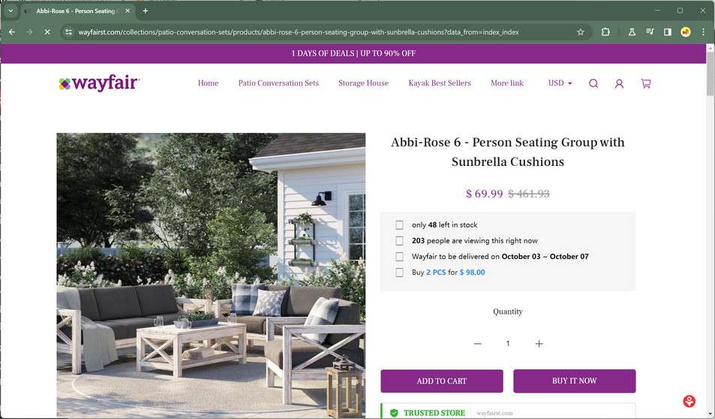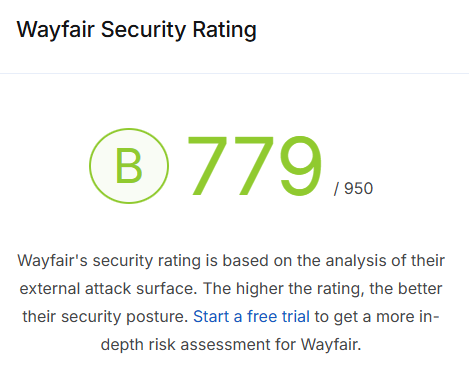Is Wayfair a Scam?
Laura Martisiute
Reading time: 8 minutes

Table of Contents
If you’re thinking of using Wayfair, you need to know: Is Wayfair a scam?
Below, we explain whether Wayfair is a scam and discuss some steps you can take to improve your safety when using this online store.
What Is Wayfair?
Wayfair is a store that sells furniture and home goods.

It operates primarily online but has a few physical stores, as well.
Its product range includes furniture, home decor, kitchenware, pet supplies, lighting, and more. It sells to customers in Europe and North America.
The company partners with thousands of global suppliers who agree to its wholesale terms and let Wayfair control pricing, promotions, and logistics. However, it also has a portfolio of over 20 in‑house brands.
Wayfair was founded in 2002 as CSN Stores and rebranded to Wayfair in 2011. It is a publicly listed company.
Is Wayfair a Scam?
No, Wayfair is not a scam. It’s a legitimate company that sells furniture and home goods, mostly online.
However, Wayfair gets fairly negative reviews online:
- 1.3 out of 5.0 stars (from 4,780 reviews) on Trustpilot.
- 1.5 out of 5.0 stars (from 2,295 reviews) on REVIEWS.io.
- 1.2 out of 5.0 stars (from 6,773 reviews) on Consumer Affairs.
- 1.9 out of 5.0 stars (from 2,569 reviews) on the Better Business Bureau.
- 1.3 out of 5.0 stars (from 2,036 reviews) on Sitejabber.
- 4.8 out of 5.0 stars (from 363,916 ratings) on Google Play.
- 2.3 out of 5.0 stars (from 94 ratings) on Pissed Consumer.
Most complaints are about product quality, delivery timelines, and poor customer service.
However, some reviews are positive. For example, one reviewer on Consumer Affairs said Wayfair did an excellent job fulfilling their order, assembling, and delivering.

Another positive reviewer on Mumsnet.com said they’ve bought several things from Wayfair and have always been pleased.

On Reddit, people have mixed reviews.
Some say they’ve had a bad experience with Wayfair (again, customer service seems to be the biggest issue), while others say they’ve had a good experience.
People generally recommend reading product reviews before making a purchase on Wayfair and reverse image searching products to see if they’re available elsewhere (including directly from the manufacturer).
Wayfair is Better Business Bureau accredited and has an A+ rating.
Wayfair scams
As is the case with pretty much any store or brand, scammers love to impersonate Wayfair.
Last year, for example, there were reports of a fake Wayfair clearance sale that offered up to 90% off.

Scammers set up a website that looked like the legitimate Wayfair site and brought traffic to it through online ads (usually on social media). Though massive discounts (sofa for $99 instead of $3,000) are a massive red flag, they can also be very enticing.

Security
As per its privacy policy, Wayfair uses third-party payment processors like Stripe to process your payments. Wayfair doesn’t have access to your full payment information.

These payment providers are PCI-compliant.
In terms of general security, Wayfair says it uses “appropriate technical and organizational safeguards designed to protect your information from unauthorized use, disclosure, and loss.”
It uses “encryption technology, including current industry-standard encryption protocols, to protect personal information in certain areas of our Sites during transmission across the Internet.”

The cybersecurity company UpGuard gives Wayfair a security rating of 779/950.

Among the issues found are that No valid Content Security Policy is implemented and Browsers may display this website’s content in frames, both of which can lead to clickjacking attacks (when an attacker tricks you into clicking on something different from what you think you’re clicking on).
Privacy
In its privacy policy, Wayfair explains the kind of data it collects, why, and with whom it shares it.
Wayfair collects the following personal information that you provide:
- Contact details and account data, e.g., name, address, phone number, email address.
- Profile information you choose to share, e.g., date of birth, location, gender. Wayfair may also ask for additional information for identity verification, like a government-issued ID number if you don’t have a Wayfair account (e.g., if you are making a return at a brick-and-mortar store in the US).
- Payment information (but Wayfair does not have access to your full payment data).
- Tax-related information, e.g., Social Security number, if you are a B2B customer or participate in Wayfair’s product review program.
- Financial information (if you apply for financing solutions).
- Communications with Wayfair, e.g., emails, texts, call recordings.
- Other information you choose to share, e.g., product reviews and survey responses.
It also automatically collects your purchase history, saved items, log data, device information, and geolocation information.
Plus, it may collect your contact details and social media profile information from third parties.
Wayfair uses this information to deliver its service, communicate with you, and protect you and other users. It also uses this data for research and development, marketing and advertising, and compliance.
It may share your data within Wayfair (e.g., affiliates, internal teams, brands), service providers, advertising partners, financing providers, and authorities. It may also share your information in business transactions (e.g., merger, acquisition, bankruptcy sale). It can also share your anonymized data freely.
According to Wayfair’s terms of service, any inputs you provide to Wayfair’s chatbots or other Generative AI are not guaranteed to be confidential. These inputs may be used “to further enhance and improve” those AI models.

Wayfair warns that anything you share on publicly-accessible Wayfair blogs, forums, or reviews, may be accessed by others. You can ask Wayfair to remove your information from these sources. However, Wayfair says it may not be able to do so in all cases.

Wayfair will retain your information for as long as you have a Wayfair account or for as long as they need this information to fulfill the purpose for which it was collected. It may also keep some of your data for legal compliance, dispute resolution, and fraud prevention.
Your privacy rights and choices include the following:
- Review and update your account information.
- Request deletion of your Wayfair account.
- Opt out of email marketing communications.
- Opt out of marketing texts.
- Opt out of online tracking.
- Make personal information requests (e.g., ask to see or delete your data).
The Common Sense Privacy Program gives Wayfair’s privacy policy a “Warning” rating. This means the privacy policy “Does not meet our recommendations for privacy and security practices.”

Some of the issues flagged by the Common Sense Privacy Program include Wayfair sharing personal information for third-party marketing and displaying personalized advertising.
So, Should You Use Wayfair?
Probably.
It’s a legitimate furniture store known for a broad selection of products and frequent deals.
That said, customer reviews vary, with most complaints concerning delivery times, product quality (be sure to read product reviews), and poor customer service.
How to Use Wayfair Safely
- Create a strong, unique password for your Wayfair account. Don’t use personal information, and don’t reuse the password elsewhere.
- Create a Wayfair account. Don’t sign in using another social account (Facebook, Google, etc.). Instead, create a Wayfair account to minimize data sharing.
- Don’t share unnecessary information in your profile. Don’t fill out your gender, date of birth, and other optional fields unless truly necessary.
- Be careful what information you share in user-generated content. Anything you post in reviews, forums, or AI features may be public or used for model training.
- Opt out of email marketing. You can opt out of email communications by updating your preferences here or clicking the “unsubscribe” link in any marketing message from Wayfair. It can take Wayfair up to 48 hours to process your request and update their systems. Even if you opt out, Wayfair will send you administrative and service communications, such as your order updates.
- Opt out of marketing texts. You can do this by texting “STOP.”
- Reverse image search the product. To see if it’s available elsewhere for cheaper.
- Read product reviews. That way, you can spot any quality issues before you make a purchase.
- Block interest‑based ads. Enable the Global Privacy Control (GPC) in your browser or visit Wayfair’s “Your Privacy Rights & Choices” page to opt out of targeted advertising.
- Manage your cookies. Use your browser’s cookie/settings panel (or a privacy extension) to reject third‑party cookies, or clear your cookies regularly.
- Double-check the URL. Always make sure you’re on the official Wayfair website (https://www.wayfair.com). Also, check that it has a valid TLS certificate (padlock in the address bar).
- Don’t click on suspicious links. Instead of clicking a link in an email or text, go to the Wayfair website manually.
- Use a virtual card. These kinds of cards can provide extra protection, though Wayfair uses PCI‑compliant services like Stripe and doesn’t store your full card number on their servers.
- Keep an eye on your statements. That way, you can quickly spot any transactions you didn’t make.
- Don’t put personal data in Wayfair’s AI chatbots or features. Your inputs may be retained and used for training.
Our privacy advisors:
- Continuously find and remove your sensitive data online
- Stop companies from selling your data – all year long
- Have removed 35M+ records
of personal data from the web
Save 10% on any individual and
family privacy plan
with code: BLOG10
news?
Don’t have the time?
DeleteMe is our premium privacy service that removes you from more than 750 data brokers like Whitepages, Spokeo, BeenVerified, plus many more.
Save 10% on DeleteMe when you use the code BLOG10.

















